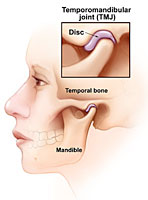TMJ Disorder describes a variety of conditions affecting the temporomandibular joint (the joint that connects your lower jaw to your skull, and allows your upper and lower jaw to open and close and facilitates chewing and speaking). The exact cause of the disorder is unknown. some factors are related to an improper bite, injury, arthritis, severe stress, or a combination of factors.
 Such disorders are often accompanied by:
Such disorders are often accompanied by:
- Frequent headaches and neck pain.
- Jaw pain while chewing, biting or yawning.
- Clicking or popping sound when opening and closing their mouths.
- Difficulty opening and closing your mouth.
- Sensitive teeth without any signs of dental problems.
- Burning sensation in the mouth or tongue.
- Grinding of the teeth.
- Restricted range of jaw movement or locking of the jaw in an open or closed position.
Treatment of TMJ Disorders
Proper diagnosis is critical in making sure you receive proper treatment for your particular condition. We will only recommend treatment after conducting a thorough health history, clinical exam, taking x-rays and other diagnostic tests. Treatment may be simple or require more steps to correct the condition.
Some of these treatments include:
- Performing muscle stretching and relaxation techniques.
- Stress management and reduction techniques.
- Fitting of a dental mouth guard, such as a splint or bite plate, to help reduce clenching and teeth grinding.
- Prescription of medications such as pain relievers, muscle relaxants, analgesics, or anti inflammatory drugs .
- (Arthrocentesis) which consist of injecting the joint with local anesthetic and fluid to flush out inflamed fluids.
- Surgery (Arthroplasty) which refers to all types of surgery for TMJ, including disk repositioning, discectomy and joint replacement